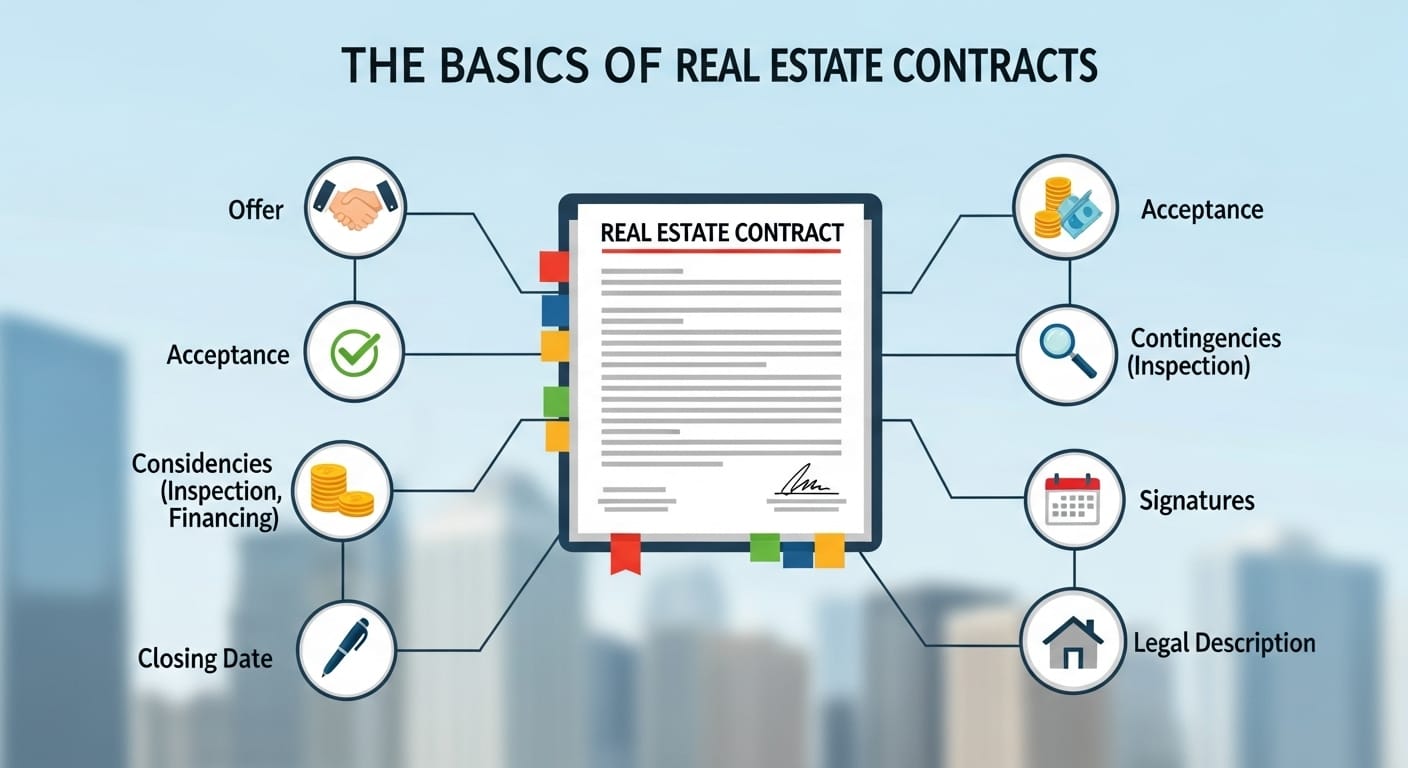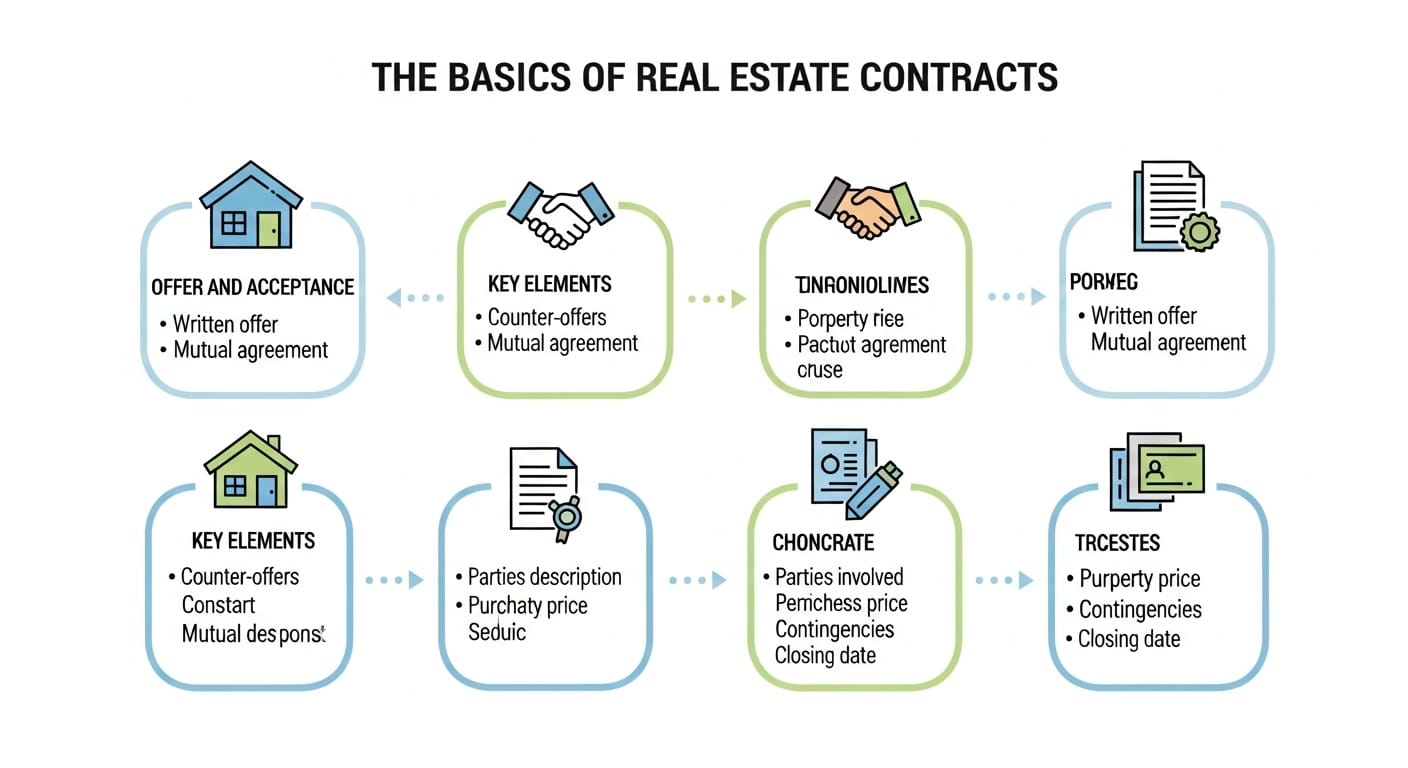Please Note: This post may contain affiliate links. If you click one of them, we may receive a commission at no extra cost to you. As an Amazon Associate, I earn from qualifying purchases.
Real estate contracts. Just hearing those words might make you think of stacks of paper, long-winded terms, and the sneaking suspicion that someone, somewhere, is making this all more complicated than it needs to be.
If you’ve ever wondered how something as simple as buying or selling property became such a labyrinth of legal jargon, you’re not alone. But here’s the good news: you don’t need a law degree to understand the basics. You just need a little guidance, a pinch of humor, and maybe some strong coffee.
Real estate contracts are the backbone of any property transaction. They spell out who does what, when, where, and how much everyone owes. It’s kind of like a set of rules for a high-stakes Monopoly game, but with way more paperwork and fewer colorful tokens. So, let’s break it down, piece by piece, and see what these contracts are all about.

Top Takeaways and Key Concepts
Know the Parties: Identify all participants, their roles, and responsibilities to prevent misunderstandings or disputes.
Understand Offer and Acceptance: Ensure mutual agreement on terms before moving forward to avoid legal confusion.
Manage Earnest Money Properly: Use deposits to show good faith and know refund rules if deals fall through.
Use Contingencies as Safety Nets: Include clauses for inspections, financing, or home sales to protect both parties.
Pay Attention to the Fine Print: Review all deadlines, clauses, and property details with a professional to avoid pitfalls.
Summary of This Article
The article explains the essentials of real estate contracts, emphasizing clarity, preparation, and protection in property transactions. Key components include identifying all parties, understanding offer and acceptance, managing earnest money, and using contingencies to safeguard both sides. Attention to the fine print and closing procedures is critical to prevent legal issues or breaches. By knowing your rights, preparing thoroughly, and seeking professional guidance when needed, buyers and sellers can navigate real estate contracts more confidently and avoid costly disputes.
Understanding the Parties Involved

At the heart of any real estate contract are the parties involved. You’ve got the buyer, the seller, and, quite often, a few other players, like agents, attorneys, and possibly a neighbor who always seems to know what’s going on. Each person or entity has specific responsibilities and expectations, and the contract is where it’s all laid out.
By the way, did you know that if one party fails to hold up their end of the bargain, it can lead to legal disputes? For example, a seller might fail to disclose that the basement floods every spring, or a buyer might back out at the last second because they found a house with a pool. Knowing who’s responsible for what can save everyone a lot of headaches—and maybe even a courtroom visit.
The Importance of Offer and Acceptance
Offer and acceptance are the peanut butter and jelly of real estate contracts. Without them, you just have a lot of unrelated ingredients sitting on the counter. The offer is made by the buyer, typically in the form of a formal document, and the acceptance comes from the seller when they agree to the terms.
Interestingly enough, this is also where things can get tricky. A seller might counteroffer, which is essentially them saying, “Sure, I’ll sell, but only if you sweeten the deal.” Negotiations can go back and forth like a tennis match, with the final terms only set when both parties agree.
The Role of Earnest Money
Earnest money is one of those terms that sounds fancy but is really just a deposit. Think of it as a way for the buyer to say, “I’m serious about this.” It’s a good-faith gesture that shows the seller the buyer isn’t just kicking tires.
To be fair, earnest money isn’t always required, but it’s a common practice. And yes, there are rules about what happens to it if the deal falls through. If the buyer backs out for a valid reason, like failing a home inspection, they might get it back. If they back out because they “found something better,” well, don’t expect much sympathy—or your money.
Understanding Contingencies
Contingencies are the “if this, then that” clauses of real estate contracts. They’re conditions that must be met for the deal to go through. For example, a common contingency is the home inspection. If the inspection reveals major issues, the buyer can back out without penalty.
Speaking of which, contingencies are not one-size-fits-all. They can include anything from financing approval to the sale of the buyer’s current home. They’re like the safety nets of the real estate world, giving both parties a way to back out if things don’t go as planned.
The Fine Print
Ah, the fine print. This is where the real magic—or mischief—happens. The fine print includes all those details that don’t make the headlines but are still critically important. Think deadlines, legal descriptions of the property, and those sneaky clauses that could trip you up if you’re not paying attention.
Honestly, this is where having a good attorney or real estate agent comes in handy. They can spot red flags faster than you can say, “Wait, what does that mean?”
The Closing Process
Closing is the grand finale of the real estate process. It’s the day when all the paperwork is signed, the keys are handed over, and everyone breathes a sigh of relief—or panic, depending on how well things have gone.
On the other hand, closing can be nerve-wracking because it’s when the money changes hands. You’ll sign what feels like a million documents, pay any outstanding fees, and finally get to call the property yours—or wave goodbye to it, if you’re the seller.
What Happens When Things Go Wrong
Real estate contracts don’t always go smoothly. Sometimes, one party fails to meet their obligations, and things get messy. Maybe the seller decides not to move out on time, or the buyer suddenly can’t secure financing.
If that happens, legal recourse may be necessary. Breaches of contract can lead to lawsuits, and trust me, nobody wants to go down that road unless they have to. But knowing your rights—and having a strong contract to back you up—can make all the difference.
Knowing When to Call for Help
At the end of the day, real estate contracts are complex, and it’s okay to admit when you need help. Whether it’s a real estate agent, an attorney, or even a trusted friend who’s been through it before, having someone in your corner can make the process a lot less daunting.
Resources:
Basics of Real Estate Contracts
http://www.realestateguide.com/contracts-basics
Understanding Contract Contingencies
http://www.contracthelp.com/contingencies
Legal Options for Breach of Contract
http://www.lawassist.com/breach-options
Frequently Asked Questions
What is a real estate contract?
A real estate contract is a legally binding agreement outlining the terms and conditions of a property transaction between a buyer and a seller.
Who are the main parties involved in a real estate contract?
The primary parties are the buyer and seller, though agents, attorneys, and lenders may also participate to ensure compliance and proper documentation.
What does “offer and acceptance” mean in real estate contracts?
Offer and acceptance occur when the buyer proposes terms and the seller agrees, forming a mutual understanding that finalizes the contract terms.
What is earnest money and why is it important?
Earnest money is a deposit showing the buyer’s commitment. It protects sellers from unserious buyers and may be refunded or forfeited depending on contract terms.
What are contingencies in a real estate contract?
Contingencies are conditions that must be met—such as inspection or financing approval—allowing either party to cancel the deal without penalty if unmet.
What happens during the closing process?
Closing is when all documents are signed, payments made, and property ownership is officially transferred from the seller to the buyer.
What should I do if a real estate contract is breached?
If one party fails to meet their obligations, legal action may be necessary. Consulting an attorney can help enforce the contract or recover damages.

Kevin Collier is a legal expert passionate about simplifying complex legal concepts for everyday individuals. With a focus on providing clear, practical information, he covers a wide range of topics, including rights, responsibilities, and legal procedures. Kevin aims to empower readers with the knowledge they need to navigate the legal landscape confidently, ensuring they can make informed decisions regarding their legal matters. Through insightful articles and easy-to-understand resources, he helps demystify the law, making it accessible to all.










